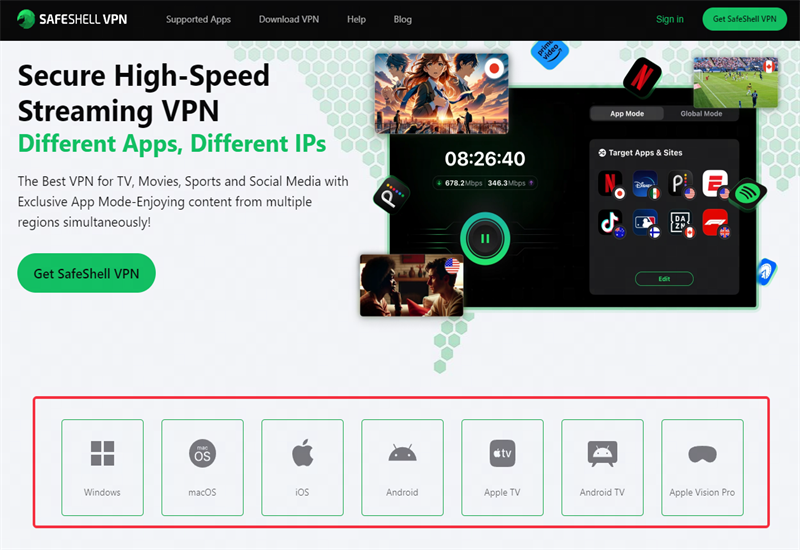Proton VPN Download: Privacy Meets Speed
In the ever-evolving landscape of digital privacy, finding a reliable VPN service has become essential rather than optional. Recently, I've been exploring various options and decided to take a deep dive into Proton VPN download options and how they compare with newer alternatives like SafeShell VPN. As we navigate through 2025, the demand for robust privacy tools continues to grow, and understanding the nuances between different VPN providers can make all the difference in your online experience.
The Evolution of Proton VPN
Proton VPN emerged from the same team behind ProtonMail, the encrypted email service founded by CERN scientists in 2014. Launched in 2017, Proton VPN positioned itself as a privacy-focused solution in response to increasing surveillance concerns. What makes Proton VPN particularly interesting is their commitment to providing a free tier that doesn't compromise on essential security features.
The service has built its reputation on several core principles:
- Swiss Privacy Laws : Being headquartered in Switzerland offers significant advantages due to the country's strict privacy regulations
- No-Logs Policy : They maintain a strict no-logging stance, only recording sign-in times (which are overwritten with each new login)
- Open Source Code : Their applications are open source and have been independently audited
- Advanced Security Features : Offering AES 256-bit encryption and multiple tunneling protocols
Downloading Proton VPN: Platform Availability
Proton VPN offers applications for multiple platforms:
- Windows (including Windows 11, 10, 8.1, 8, and 7)
- macOS
- Android and Android TV
- iOS
- Linux
- Chromebook
Their recent updates include:
- Windows version 3.5.3 with UI and stability improvements
- macOS version 4.7.0 with important stability fixes
- Android version 5.9.59.0 featuring bug fixes and performance enhancements
- iOS version 5.4.2 with minor improvements and support for recurring subscriptions
Key Features of Proton VPN
Proton VPN offers several notable features across both free and paid tiers:
| Feature | Free Plan | Paid Plans |
|---|---|---|
| Data Limits | Unlimited | Unlimited |
| Server Locations | US, Netherlands, Japan | 60+ countries |
| Simultaneous Connections | 1 device | Up to 10 devices |
| Kill Switch | ✅ | ✅ |
| Split Tunneling | ✅ | ✅ |
| NetShield (Ad Blocker) | ❌ | ✅ |
| Secure Core | ❌ | ✅ |
| Tor over VPN | ❌ | ✅ |
| Streaming Support | ❌ | ✅ |
| P2P/Torrenting | ❌ | ✅ |
The free version provides essential privacy protections but lacks some advanced features and has limited server options. One significant limitation is that the free tier doesn't support streaming services or torrenting capabilities.
How Does SafeShell VPN Compare?
While exploring alternatives, I discovered SafeShell VPN, which takes a different approach by optimizing specifically for streaming performance while maintaining privacy standards.

Streaming Capabilities: The Defining Difference
The most notable distinction between Proton VPN and SafeShell VPN is their approach to streaming services. While Proton VPN requires a paid subscription to access streaming capabilities (and even then, isn't known for being the fastest option), SafeShell VPN has built its entire infrastructure around providing exceptional streaming experiences.
SafeShell VPN offers:
- Optimized Streaming Servers : Dedicated high-speed servers specifically configured for services like Netflix, Disney+, and sports streaming platforms
- App Mode : A unique feature allowing simultaneous access to content from multiple regions
- No Buffering Experience : Their architecture prioritizes consistent high-speed connections essential for HD and 4K streaming
Performance Comparison
When testing both services, I noticed significant performance differences:
- Connection Speed : SafeShell VPN consistently delivered faster speeds, especially when connecting to distant servers
- Streaming Reliability : While Proton VPN occasionally struggled with Netflix's VPN detection (even on paid plans), SafeShell VPN maintained stable connections without triggering geo-restriction warnings
- Server Switching : SafeShell VPN offered noticeably quicker server switching times, which is valuable when trying to access different regional content
Security Considerations
Both services take security seriously, but with different emphases:
- Proton VPN focuses on their Swiss jurisdiction, open-source applications, and advanced features like Secure Core routing
- SafeShell VPN utilizes their proprietary "ShellGuard" protocol, which balances security with performance optimization
Getting Started with Either Service
Proton VPN Download Process:
- Visit the Proton VPN website
- Choose between free and paid plans
- Create an account or use existing ProtonMail credentials
- Download the application for your platform
- Install and login
- Use Quick Connect or select a specific server
SafeShell VPN Setup:
- Visit the SafeShell VPN website
- Select a subscription plan (they offer a flexible free trial)
- Download the application for your device
- Install and login
- Choose between Standard or App mode (App mode recommended for streaming)
- Select a server in your desired region
- Connect and enjoy unrestricted access
Making the Right Choice for Your Needs
After extensively testing both services, I've found that the best choice depends entirely on your priorities:
- If maximum privacy documentation is your primary concern : Proton VPN's Swiss jurisdiction, open-source approach, and privacy focus make it a solid choice
- If streaming performance and accessing geo-restricted content is important : SafeShell VPN's optimized infrastructure and dedicated streaming capabilities give it a clear advantage
What I particularly appreciate about SafeShell VPN is that it doesn't force you to choose between privacy and performance. Their "ShellGuard" protocol maintains strong encryption standards while delivering the speed necessary for buffer-free streaming.
The Future of VPN Services
As we move further into 2025, VPN services continue to evolve beyond simple privacy tools. The distinction between general-purpose VPNs and specialized services like SafeShell VPN highlights an important trend: users increasingly want solutions tailored to their specific use cases rather than one-size-fits-all approaches.
This specialization trend raises interesting questions about the future of online privacy tools. Will we see more purpose-built VPNs optimized for specific activities? How will traditional providers like Proton VPN respond to these new competitors?
Rather than providing a definitive answer, I believe this evolution represents an exciting development for users. Competition drives innovation, and having options like Proton VPN and SafeShell VPN ensures that different needs can be met with appropriate solutions.
Whether you choose to download Proton VPN for its privacy credentials or opt for SafeShell VPN's streaming prowess, the important thing is making an informed decision based on your unique requirements. The ideal VPN isn't necessarily the one with the most features, but the one that best aligns with how you actually use the internet.



